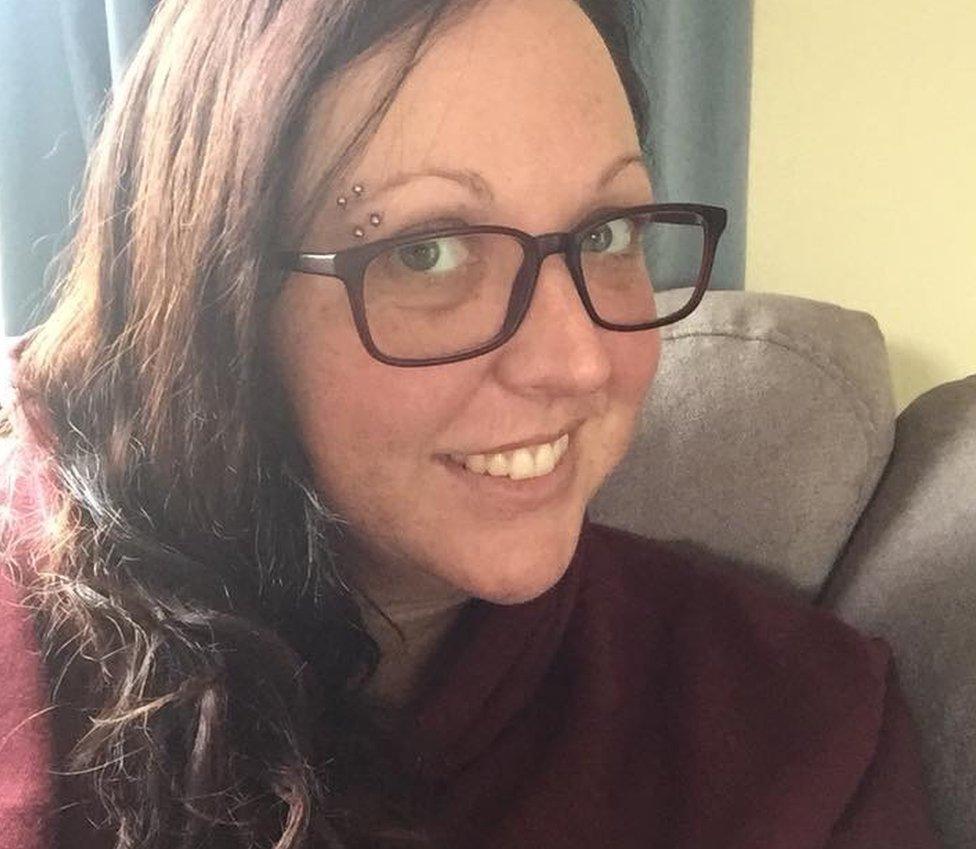From cuddles to counting - PTSD coping strategies shared
- Published

Christine has been overwhelmed by the comments attached to her original post
When a woman in Taupo, New Zealand, wrote about the love and support of her husband during her night terrors and dark days of Post Traumatic Stress Disorder (PTSD), she didn't expect the huge reaction that followed.

Christine Welten, who posted on Reddit, external about how much she appreciated her husband telling her it was OK to wake him up for cuddles, said: "I actually initially created my post more to highlight my husband's amazing nature, than my battle with PTSD."
But it soon became apparent that she had touched a lot of people also struggling with the disorder, people who were inspired to share their stories. Her post received more than 25,000 upvotes in 10 days.
"It was humbling for both my husband and I to see the love and community that came out of one simple post," she said.

Christine shares her experience of PTSD at public events as well as on social media
As an author and public speaker on mental health matters, Christine is quite accustomed to starting discussions on social media, external, but said she found it much harder to speak openly about the issues behind her PTSD.
"Even when it is uncomfortable, I try to be as open as I can," she said and praised all those who shared their own experiences of PTSD as "so brave".
"It restored my faith in humanity hearing so many people say they want to support and love their partners the best they can."
One comment included advice on getting through a panic attack, external by counting down and naming five things you can see, four things you can touch, three things you can hear, two things you can smell and one thing you can taste.
"This has literally never failed me during a panic attack," Reddit user renderdoodles wrote.
"Sometimes I panic so much I can't focus to just do it in my head and I'll force myself to mutter it aloud under my breath. I've yet to make it all the way to the end without becoming less anxious."

You might also like:

As the sharing continued, one uploader confessed they had always wondered how to show empathy better to their partner, adding they would "shamelessly steal, external" Christine's husband's idea.
Praise poured in for him, with one person calling him a "keeper",, external while others shared their own struggles with PTSD, saying half the battle, external is simply having someone there.
One Reddit user shared the similar tactics, external used by their boyfriend: "My boyfriend does something similar. I have terrible OCD and often get into a panic at night and I'll just cuddle up to him and he'll wake up and hold me, never angry. If it's really bad and I'm in tears, he'll sit up and help me through it, get me water etc. It's one of the many reasons I love him."
Christine responded to some of the posts about coping strategies, and particularly loved one from somebody praising their partner's kindness, consideration and compassion which read: "I never expected anyone to act that way. I've never felt more loved. I love my best friend and team-mate."
The post added that the person's partner gives them a "pop quiz", external before bed to calm them down.
"He asks me where he's at, when can I wake him up, and so on. The answers are always in the other room and whenever I need him. It doesn't matter if he's asleep, if I'm having a bad night and need him, just go.
"It is the sweetest thing, and I didn't know people were that considerate and compassionate and loving, or more so."
Although there were one or two people who questioned whether PTSD is a real condition, Christine said she was taken aback by some of the heartfelt comments: "To find myself in tears from some of the posts and the overwhelming sense of love I received from the majority of them was hugely cathartic and validating," she said.

What is PTSD?
An anxiety disorder caused by very stressful, frightening or distressing events. Sufferers may experience feelings of isolation, irritability and guilt, have problems sleeping and find it hard to concentrate
It's often associated with soldiers who have experienced intense combat
The NHS says, external that someone with PTSD may often relive the traumatic event through nightmares and flashbacks
Help and information on PTSD is available through the BBC advice pages.
Written by Sherie Ryder, UGC and Social News
- Published23 July 2018

- Published28 August 2018

- Published3 May 2018
